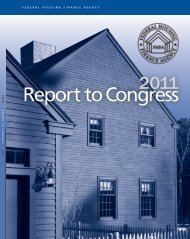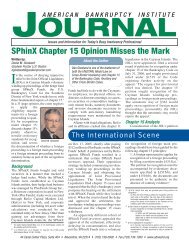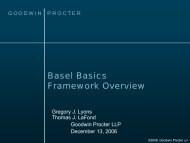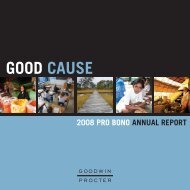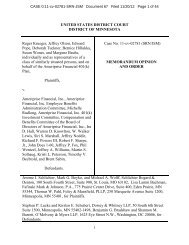Here - Goodwin Procter LLP
Here - Goodwin Procter LLP
Here - Goodwin Procter LLP
Create successful ePaper yourself
Turn your PDF publications into a flip-book with our unique Google optimized e-Paper software.
BUILDING CONSENSUS IN A MUNICIPAL BANKRUPTCY<br />
By: Meagan Costello<br />
Throughout the United States, many municipalities are facing severe financial distress and being forced to examine Chapter<br />
9 (http://www.law.cornell.edu/uscode/text/11/chapter-9) -- the section of the Bankruptcy Code governing municipality<br />
eligibility -- as a means of eliminating debt and restructuring their obligations.<br />
While the causes of financial distress vary among municipalities, municipal creditors are often composed of the same<br />
groups, a mix of “ordinary people” such as pensioners and civil servants, combined with sophisticated financial institutions<br />
and bondholders.<br />
Add these diverse constituencies to the current political environment, mix in the fact that municipalities must often raise taxes<br />
to raise revenue, and the result is often a prolonged political battle that provides little progress towards a real solution.<br />
It is often overlooked that the Bankruptcy Code itself attempts to alleviate the potential for stalemate and assuage fears that if<br />
bankruptcy is “too easy” there will be a rash of unnecessary municipal filings. The Bankruptcy Code does this by generally<br />
requiring municipalities to work with their creditors as a prerequisite to filing for protection under Chapter 9.<br />
Chapter 9 (http://www.law.cornell.edu/uscode/text/11/109) requires the municipality to demonstrate that prior to filing for<br />
bankruptcy, it:<br />
<br />
<br />
<br />
Obtained the agreement of certain creditors to the restructuring plan; or<br />
Negotiated with creditors but was unable to reach a resolution; or<br />
Show that although it did not negotiate with its creditors, engaging in the process would have been impractical.<br />
Additionally, some states, such as California (http://www.leginfo.ca.gov/pub/11-12/bill/asm/ab_0501-<br />
0550/ab_506_bill_20111009_chaptered.html) , require a municipality to attend mediation with its creditors before filing for<br />
Chapter 9 protection (unless a state of emergency exists.) Failure to adhere to these requirements can result in dismissal of<br />
the bankruptcy petition.<br />
This pre-filing negotiation process is intended to expedite the Chapter 9 process and maximize its efficiency. Creditors should<br />
use this process wisely and recognize that, no matter what the cause of a municipality’s financial woes, all parties will need to<br />
compromise their claims for a prompt and efficient resolution.<br />
Fundamentally, all restructurings are simply a matter of math: the assets of the debtor must be valued, measured against the<br />
claims asserted, and then distributed accordingly. The more quickly major constituencies (including the taxpayers) accept<br />
the inevitable, the faster municipalities can move forward with reorganization, emerge from Chapter 9 protection and<br />
establish a new sense of normalcy.<br />
FOR MORE ANALYSIS AND COMMENTARY VISIT MUNIBK at http://blog.munibk.com/





